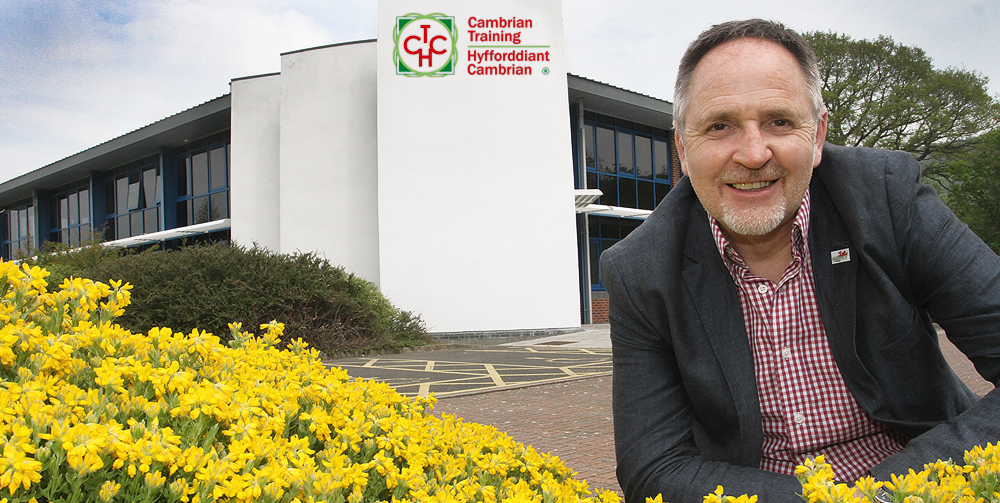The Welsh Government is being challenged to prioritise the compulsory education system in Wales to provide the foundation for the future skilled workforce needed by employers.
Arwyn Watkins, OBE, managing director of Cambrian Training Company, the leading apprenticeships provider to the hospitality industry in Wales, will make the call when addressing delegates at the Mid Wales Tourism and Hospitality Conference at The Metropole Hotel, Llandrindod Wells on November 9.
Arwyn Watkins, OBE, managing director of Cambrian Training Company, the leading apprenticeships provider to the hospitality industry in Wales, will make the call when addressing delegates at the Mid Wales Tourism and Hospitality Conference at The Metropole Hotel, Llandrindod Wells on November 9.
Referring specifically to the recruitment crisis in the hospitality industry caused by Brexit and the Covid-19 pandemic, Mr Watkins will warn that there are no quick fixes and that there is “no workforce riding over the hill to rescue us”.
He believes the long-term solution rests with the Welsh and UK Governments rebalancing the focus of the education system to direct more school leavers towards apprenticeships in industries where they are most needed.
By encouraging so many school leavers to aspire to attend Higher Education Institutions rather than towards Higher Level Skills, he says the “well-oiled machine” is taking a significant percentage of the most talented, productive students from the economy.
He says students often go on to achieve degrees in subjects unrelated to the skills needed by employers in the region. He describes it as a “human resource drain” and wants schools to give apprenticeships parity of esteem with degrees.
Mr Watkins, a former Army apprentice chef who is now president of the Culinary Association of Wales, wants the hospitality industry to engage with children from primary school age upwards to make them aware of rewarding careers within it.
“How are children made aware of the opportunities within our industry?” he asked. “The answer is, they are not and that must change. Every hospitality business needs to have a conversation with their politicians, both in Wales and across the UK.
“Changing the compulsory education system is not going to win votes but meeting the needs of the economy is far more important to the country than votes.”
He says hospitality businesses must learn how to attract people into the industry and retain them by creating a flexible working environment where they feel valued. They must also engage with their local communities to recruit their future workforce.
“There are some really good businesses here in Mid Wales and if an individual has chosen to stay in the region to develop their career, then we have a duty as employers to create opportunities for them,” he added
“The world has changed since the pandemic began and employees rightly expect a good work-life balance. The industry has to respond by creating opportunities for flexible working hours and career development pathways which some employers are already doing.”
He will also question whether consumers are prepared to pay more for hospitality services in the future, which is the inevitable consequence of the rising cost of food, labour, fuel and taxation.
Tickets for the conference, which is organised by MWT Cymru and supported by Visit Wales, must be booked by October 31 at www.midwalestourismconference.co.uk . It will be the first major tourism and hospitality conference held in Wales since the Covid-19 pandemic began in the UK last year.
He believes the long-term solution rests with the Welsh and UK Governments rebalancing the focus of the education system to direct more school leavers towards apprenticeships in industries where they are most needed.
By encouraging so many school leavers to aspire to attend Higher Education Institutions rather than towards Higher Level Skills, he says the “well-oiled machine” is taking a significant percentage of the most talented, productive students from the economy.
He says students often go on to achieve degrees in subjects unrelated to the skills needed by employers in the region. He describes it as a “human resource drain” and wants schools to give apprenticeships parity of esteem with degrees.
Mr Watkins, a former Army apprentice chef who is now president of the Culinary Association of Wales, wants the hospitality industry to engage with children from primary school age upwards to make them aware of rewarding careers within it.
“How are children made aware of the opportunities within our industry?” he asked. “The answer is, they are not and that must change. Every hospitality business needs to have a conversation with their politicians, both in Wales and across the UK.
“Changing the compulsory education system is not going to win votes but meeting the needs of the economy is far more important to the country than votes.”
He says hospitality businesses must learn how to attract people into the industry and retain them by creating a flexible working environment where they feel valued. They must also engage with their local communities to recruit their future workforce.
“There are some really good businesses here in Mid Wales and if an individual has chosen to stay in the region to develop their career, then we have a duty as employers to create opportunities for them,” he added
“The world has changed since the pandemic began and employees rightly expect a good work-life balance. The industry has to respond by creating opportunities for flexible working hours and career development pathways which some employers are already doing.”
He will also question whether consumers are prepared to pay more for hospitality services in the future, which is the inevitable consequence of the rising cost of food, labour, fuel and taxation.
Tickets for the conference, which is organised by MWT Cymru and supported by Visit Wales, must be booked by October 31 at www.midwalestourismconference.co.uk . It will be the first major tourism and hospitality conference held in Wales since the Covid-19 pandemic began in the UK last year.

